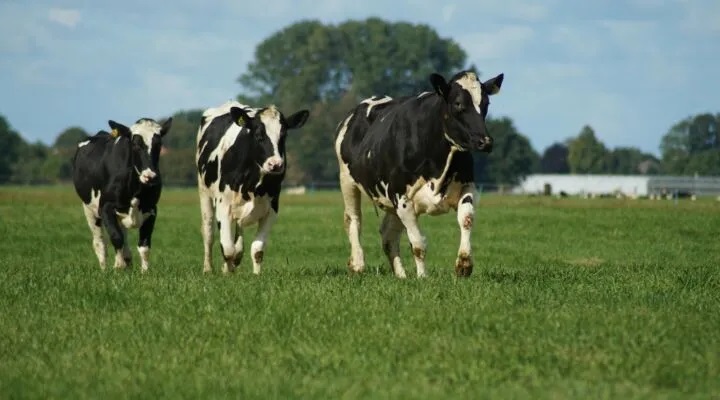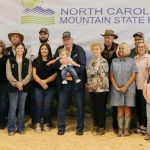
As dairy farmers today consider climate solutions, they face the challenge of having limited science-backed information guiding them in their journey toward sustainability.
The dairy community is working with research partners to bridge that gap through a project called Dairy Soil & Water Regeneration: building soil health to reduce greenhouse gases, improve water quality and enable new economic benefits. This six-year project, conducted across major U.S. dairy states, aims to shed light on management practices and novel technologies that enable dairy farmers to reach their sustainability goals and set the stage for new market opportunities, incentives and investments in dairy sustainability.
Researchers at eight institutions are studying baseline soil health and carbon storage and conducting extensive field research trials. These trials involve differing management practices and manure technologies and products on several working dairies and research farms. By collecting and analyzing comprehensive yield, soil, water and greenhouse gas (GHG) measurements, researchers are comparing soil health management system practices comprised of conservation tillage, cover crops and novel manure-based products to commonly used field practices.
The research sites encompass a diverse range of climates, soils and management practices, representing various dairy farms and their operations. While each site follows a similar experimental design, it is specifically tailored to the characteristics of each region. This approach enables the project to provide a comprehensive comparison of results across different regions.
Dairy Management Inc. and the Soil Health Institute initiated Dairy Soil & Water Regeneration (DSWR), now in its fourth year. DSWR is a key undertaking within the U.S. Dairy Net Zero Initiative, an essential first phase in a collective effort to achieve the industry’s 2050 environmental stewardship goals, which were developed through the Innovation Center for U.S. Dairy. These goals include achieving GHG neutrality, optimizing water use while maximizing recycling, and improving water quality by optimizing the utilization of manure and nutrients.
DSWR is largely supported by the Foundation for Food & Agriculture Research, which awarded $10 million toward this work, and matching funds from companies like Nestlé, Newtrient and Starbucks.
Findings are Emerging
It takes several years to observe the impact of management intervention on soil health characteristics, so we don’t yet have enough data to draw definitive conclusions. However, we are starting to get a glimpse of the early effects of soil health management systems on crop yield, GHG emissions, soil health and water quality.
An example of a preliminary result is that some research teams have observed that initial crop yields were higher on sites with commonly used field practices compared to those with soil health management systems. However, these differences were smaller by the third year. Data from further years will help us gain a better understanding of these changes.
We also have observed another trend at some of our research sites: nitrous oxide emissions were lower in the soil health management system plots fertilized with new manure-based products compared to plots with commonly used practices where liquid dairy manure was used. However, since we are still relatively early in the research, this trend does not tell the whole story of the effect of novel manure products on emissions. DSWR is taking a whole-systems approach, so there are other factors that will need to be compared across all our sites as we collect more data.
Collaborators Prove Essential
Partnerships in DSWR have been crucial. The Soil Health Institute has been side by side with Dairy Management Inc. as we’ve addressed the challenge of leading such a large-scale, multi-region project. We’ve implemented a unified approach to have standardized data collection protocols and metrics, ensuring a comprehensive dataset to allow for meaningful analysis and actionable insights.
Our collaborators and research partners have shown tremendous commitment to this work. Eight institutions are helping execute the project: Cornell University, University of California Agriculture and Natural Resources, University of California Davis, Texas A&M AgriLife Research, University of Wisconsin-Madison, University of Wisconsin-Platteville, University of Vermont and USDA’s Agricultural Research Service Northwest Irrigation and Soils Research in Kimberly, Idaho.
And, of course, the farmers who have stepped up to participate are critically important. Nearly 100 farms have been directly engaged in this project thus far.
Shared Results Will Inform & Guide
DSWR will share its findings broadly with the scientific community, farmers and other stakeholders. To date, we have provided participating farmers with individual reports detailing their farm’s soil health and soil carbon storage status as a result of our soil health and soil carbon survey in five regions.
Additionally, we are hosting regional webinars with farmers, cooperatives and local crop advisers to share our findings and offer guidance on best management practices. These webinars serve as an effective platform to initiate discussion and generate further interest among local teams and farmers. Furthermore, we provide a concise one-page snapshot for each region which can be used by farmers, local extension staff and anyone offering crop advice.
We also recently launched a website where we are sharing information about the research, the research teams and partners, and findings as they become available. In addition, we’ve developed a document that highlights progress in the project.
As we look ahead, we are optimistic that DSWR findings will have lasting impacts on how dairy farmers grow feed and shape their carbon footprints in a climate-smart future.
Foundation for Food & Agriculture Research
The Foundation for Food & Agriculture Research (FFAR) builds public-private partnerships to fund bold research addressing big food and agriculture challenges. FFAR was established in the 2014 Farm Bill to increase public agriculture research investments, fill knowledge gaps and complement the U.S. Department of Agriculture’s research agenda. FFAR’s model matches federal funding from Congress with private funding, delivering a powerful return on taxpayer investment. Through collaboration and partnerships, FFAR advances actionable science benefiting farmers, consumers and the environment.
–Reza Afshar, V.P., Soil, Feed & Water Research
Dairy Management Inc.
Foundation for Food & Agriculture Research
You can now read the most important #news on #eDairyNews #Whatsapp channels!!!
🇺🇸 eDairy News INGLÊS: https://whatsapp.com/channel/0029VaKsjzGDTkJyIN6hcP1K

























